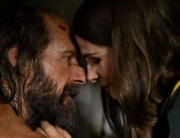Inspired by a real-life story, Lion, an intimate contemporary weepie with an epic sweep, proves the persnickety comedian W.C. Fields’s point, though in a most appealing manner. He famously advised fellow actors to never work with animals or children, and this movie’s child star gives a performance that’s the equivalent of grand larceny. As the protagonist in the first and stronger half, pint-sized powerhouse Sunny Pawar wins the hearts and tears ducts of the audience. He’s a tough act to follow, even with an emotionally stripped-down Nicole Kidman in the cast.
From the opening National Geographic-type postcard landscapes, the filmmakers give the deluxe treatment to this straightforward, personal account. Yet the eye-grabbing visuals don’t overwhelm the story of the roughly five-year-old Saroo (Pawar), an Indian boy separated from his family and adopted by an Australian couple, and who later as an adult searches for his roots.
In the beginning, set in the Khadra region of northern India, 1986, the boy joins his older brother, Giddu (Abhishek Bharate), and climbs up on a moving railroad car filled to the brim with coal. He fills his bag, and the money from the boys’ booty, sold on the black market, goes toward buying a precious commodity: milk for the entire family. (He and his two siblings are raised by his mother, who works in a rock quarry.)
Saroo aims to please Guddu. To prove his strength, Saroo lifts a chair and then a bicycle to prove he’s strong enough to help support the family. Giddu agrees to let his brother accompany him on a scavenger run (without telling their mother), but because Saroo stays out way past his bedtime, he falls asleep on a bench at a railroad station. Giddu leaves him there alone, promising to return later, and hours go by before Saroo wakes up.
With Giddu nowhere in sight, Saroo takes refuge in an empty train and wakes up later in the broad daylight as the locomotive speeds through the countryside and arrives in Kolkata, more than a thousand kilometers away from his hometown. The boy speaks Bengali, not Hindu, and isn’t sure of the name of his mother or his town. Scrappy and kindhearted, he’s the eternal street urchin. (Jackie Coogan, meet Sunny Pawar.)
Just as Saroo’s earlier objective was to earn the respect of his brother, the actor Pawar’s goal seems to be to please his director, Garth Davis, and he does so acting moment to moment in one action-packed sequence after another. As a result, the first hour is compact and stronger than the film Lion has been most compared to, Slumdog Millionaire, which is inevitable. Both feature Dev Patel, and their storylines could justly be described as Dickensian, with a main character doubling as a pinball, bouncing to and fro based on outside circumstances, set against a background of abject poverty. Living on the streets, Saroo escapes dangers that Dickens could only hint at, if he dared. (However, the tone of each film is distinct.)
The police are unable to locate his family, and Saroo is placed in an orphanage, and from there travels to Tasmania to the home of the Brierleys (played by Kidman, rocking a 1980s perm, and David Wenham). Here the film turns pensive and loses its verve, as Saroo grows up with a nagging sense of guilt regarding those he left behind in India and can barely remember.
Twenty-five years on, Saroo (now played by a bulked-up Patel) has embraced opportunities that his upper-middle-class parents have given him. (He could be seen as the model son, while his brother, also adopted from India, is prone to self-harming rages and substance abuse.) Now living in Melbourne, he’s on his way toward earning a degree in hotel management when he meets his American girlfriend, Lucy, played by Rooney Mara, in a role that’s supportive in every meaning of the word. (At the press conference at the Toronto International Film Festival, the taciturn actress said she signed on to the film not so much for the character but to support the overall story. Kidman stated that the film had special resonance for her, as a mother of two adopted children and for its theme of “the power of mothers.”)
At a student party, Saroo has a taste of a homemade Indian dessert, which provides a Proustian moment, bringing back vague memories and setting him off on a one-man Internet search for his biological family in which he cuts himself off from his parents and Lucy. Whereas the film’s first half could barely keep up with the five-year-old Saroo on the move, the pace now flags, burdened with such lines as “You can’t keep going on like this,” courtesy of Mara’s Lucy, and a sullen and mopey grown-up Saroo.
Yet the filmmakers never forget the visual part of the storytelling and keep the sequences of Saroo sitting in front of his computer to a minimum while flooding the screen with images from Google Earth. Additionally, the rough-around-the-edges performance by Patel is remarkably richer than his star-making role in Slumdognearly a decade ago. Kidman is also a revelation, in one of her most effortless and direct performances. Nevertheless, it’s a flashback toward the end of the film to the younger Saroo that recharges the film, a reminder of its pulsating beginning.







Leave A Comment